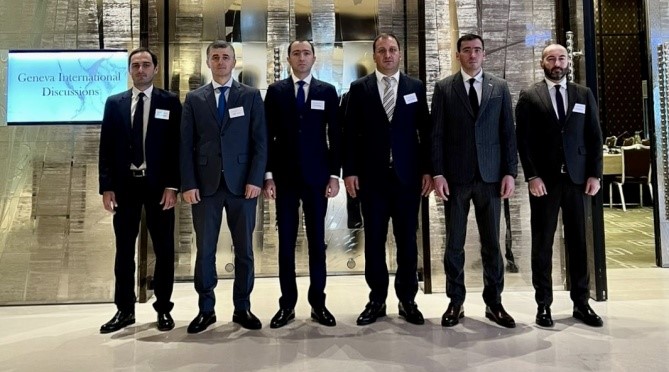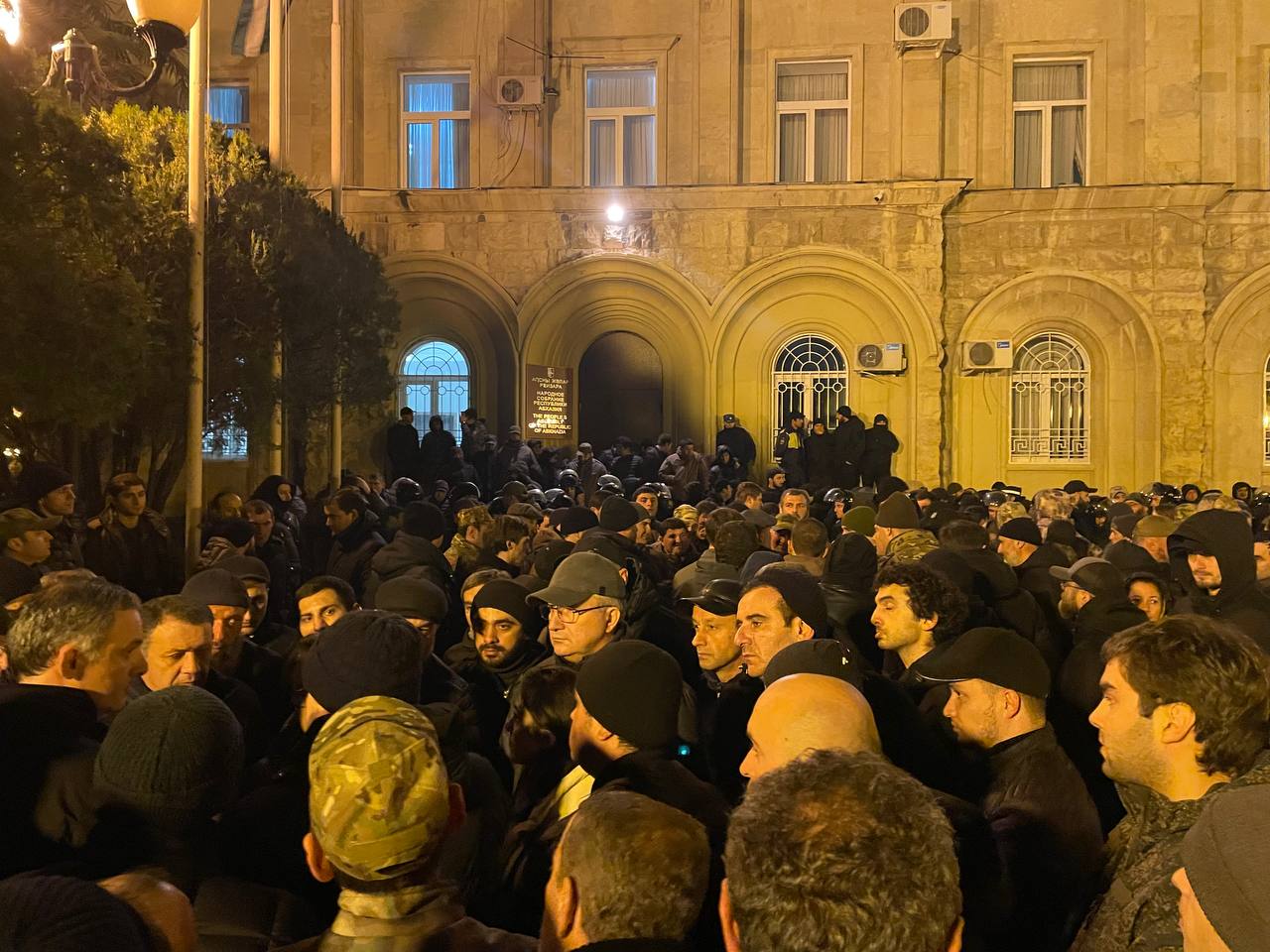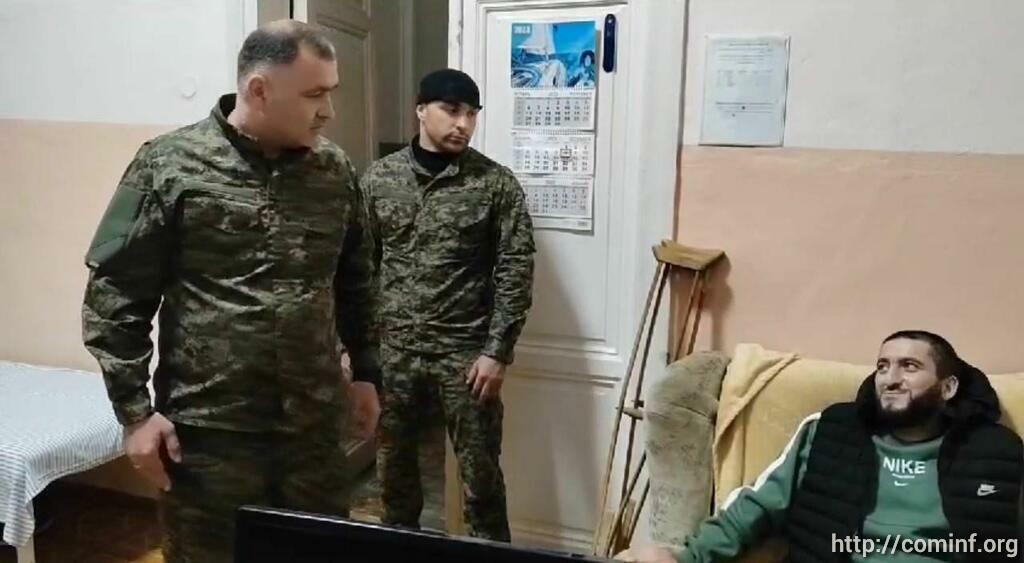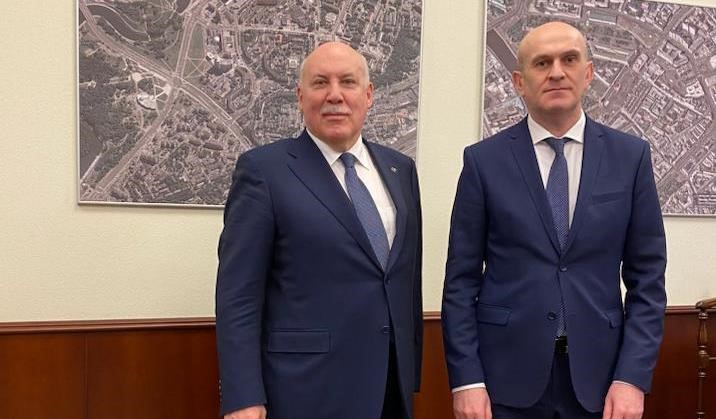-
Key Persons
-
Important Agreements
-
Chronology of Events
-
 Infographics
Infographics
-
Key Agencies
-
Chronology of Visits
-
 News
News
-
 Monthly Review
Monthly Review
Occupied Regions of Georgia: Review of Main Events and Trends

Publication: N15 / Review Period: December 1-31, 2023
The review is being prepared within the framework of the Roadmap to the Kremlin's Policy in Abkhazia and the Tskhinvali Region project. The purpose of the review is to provide readers with information about main events and trends in the occupied regions of Georgia. The review is a monthly publication and will be useful for decision-makers, public employees, media representatives and other people who are interested in the developments taking place in the occupied regions of Georgia.
Meetings in Geneva and Ergneti
The 59th round of the Geneva International Negotiations was held on December 5-6. It was the third in a row and the last meeting this year. During the meeting, along with traditional topics to be discussed, the Abkhaz side raised the issue of resuming meetings in Gali within the framework of the Incident Prevention and Response Mechanism. Meetings in Gali have not been held since 2018, after the murder of Giga Otkhozoria. The Abkhaz side, supported by Russia, has recently been actively demanding the restoration of Gali meetings. The official position of Tbilisi on this issue is not known.

Delegation of Abkhazia in Geneva
On December 13, the 116th Incident Prevention and Response Mechanism (IPRM) took place in Ergneti. This was the seventh in a row and the last meeting this year. The main issue of the meeting was the murder of Tamaz Ginturi in the village of Kirbali. The Ossetian side is trying to view the case in a “legal” context, in which Russia also agrees. The Ossetian side justified the murder of Ginturi by “border guards” saying that thay were following their “instructions.” They also spoke about the need of delimitation-demarcation of the so-called border for the prevention of similar “incidents.”
Support for Putin
Vladimir Putin, whose candidacy was formally presented on December 16, will participate in the 2024 Russian presidential elections. The de facto leaders of the occupied regions, Aslan Bzhania and Alan Gagloyev, have already supported his candidacy.
Russia Continues to Finance the “Budgets” of the Occupied Regions
Russian funding will remain critically important for the occupied regions’ “budgets” in 2024. The situation in the Tskhinvali region remains unchanged in this regard. Unlike Abkhazia, part of whose “budget” is replanished from its own income, the Tskhinvali region remains completely dependent on Russia’s financing. In December, the “budget” of the Tskhinvali region for 2024 was approved. It will total RUB 8 billion 836 which includes RUB 7 billion 35 million Russian financial aid, of which RUB 5 billion 942 thousand will be allocated for the socio-economic development, and RUB 1 billion 93 million - as budgetary investment.
Abkhazia also adopted the “budget” for 2024. According to the main parameters of the “republic budget” for 2024, the revenues to the “budget” will be up to RUB 12 billion 100 million, out of which Russia's financial assistance will be: RUB 3 billion 900 million for the socio-economic development, RUB 1 billion 93 million the purpose of budgetary investments within the framework of the implementation of the investment program promoting the socio-economic assistance of Abkhazia for 2023-2025, and RUB 162 million for the implementation of the economic development program of Abkhazia in 2022-2025.
Abkhazia
“Bichvinta State Country House” was Transferred to Russia
On December 27, in the morning, the de facto parliament of the occupied region held an extraordinary session and supported the handover of the “Bichvinta state country house” and its surrounding area to Russia. The session was scheduled for December 28, but the de facto government held the session ahead of schedule to neutralize opposition sentiments. Opponents of the agreement gathered at the “parliament” building during the night. Consequently, the de facto government made a precaution and mobilized the Armed Forces.

Opponents of the Transfer of the “Bichvinta State Country House” to Russia Near the so-called Parliament Building
The de facto President Aslan Bzhania confirmed the decision of the “parliament” later on December 27. He signed a law “On the ratification of the agreement between the government of the Republic of Abkhazia and the government of the Russian Federation on the transfer of an object on the territory of the Republic of Abkhazia to the ownership of the Russian Federation and the procedure for its use” (the agreement was signed on January 19, 2022 in Moscow).
The adoption of additional legislative amendments by Bzhania was a kind of compromise. The amendment establishes a ban on the transfer of objects, land plots and part of sea areas to third parties. Otherwise, the ratification of the agreement will be denounced, and the object will be returned to the ownership of Abkhazia.
By virtue of the agreement, only the buildings whose maintenance and repairment will be implemented by the Federal Security Service of Russia will be transferred to Russia, and the territory will be transferred to Russia on a 49-year lease.
Russia severely criticized the protest against the transfer of the country house. A deputy of the Russian Duma, Konstantin Zatulin, said that “it’s a shame that a certain opposition in Abkhazia is using this particular reason to settle scores with the authorities.” The Russian Federation Council also made an assessment, where the Chairman of the Foreign Affairs Committee, Grigory Karasin, said that the unrest was organized from outside.
For the last two years, the de facto government has been actively trying to ratify the agreement on the transfer of the “Bichvinta state country house” to Russia; however, the issue was not be accepted until now due to internal opposition. The de facto government accused the opponents of inciting anti-Russian sentiments and being funded from abroad, on the other hand, the de facto government was accused of losing “sovereignty” and selling “Abkhaz land.”
Secret Negotiations in Zugdidi
Opposition media of the de facto government spread information that the de facto Deputy Prime Minister and the Minister of Economy, Kristina Ozgan, was in Zugdidi to discuss energy issues. In a few days, Ozgan confirmed the information about the December 22 visit in Zugdidi. According to her, the meeting took place at the Engurhesi dam and discussed the volume of electricity generation in the period of January-March 2024, as well as the issues related to the operation of the Engur HPP. Information about Ozgani's visit to Zugdidi and her meeting with the Deputy Minister of Economy and Sustainable Development of Georgia, Romeo Mikoutadze, was later spread in the Georgian media.
The necessity of Ozgan's “covert” visit can be explained by the energy crisis created in Abkhazia. Due to the increased demand for electricity (including for “mining” purposes) in Abkhazia in recent years, the de facto government needs to find ways to overcome the crisis. Cooperation with the Georgian side is considered as one of the ways forward in overcoming the crisis.
Attack Against USAID
USAID became a special target for Inal Ardzinba, the de facto Minister of Foreign Affairs of the occupied Abkhazia, who accused the organization of implementing hidden goals within the framework of humanitarian projects. Ardzinba called all attempts by international organizations to interfere in the internal affairs of Abkhazia futile. This time, USAID was on the agenda, which, according to Ardzinba, is trying to achieve its own goals. He believes that “USAID's first task is the restoration of the so-called territorial integrity of Georgia through the reintegration of Abkhazia into Georgia. “Of course, this task is absolutely unacceptable, and we will not allow it to be realized,” he added. The second task is to counter the so-called harmful influence of the Kremlin.” According to Ardzinba, these goals are listed on USAID's official website and that is why projects financed by the organization were banned in Abkhazia.
Ardzinba announced new decisions against USAID:
- Declare the USAID Regional Director, John Pennell, persona non-grata;
- New projects with partial or full financial support from USAID will no longer be certified by the Ministry of Foreign Affairs of the Republic of Abkhazia.
- It is prohibited to implement projects whose purpose is to establish contacts between citizens of the Republic of Abkhazia and citizens of Georgia.
- The Ministry of Foreign Affairs of the Republic of Abkhazia will not approve projects with vague and inaccurate information that does not fully reflect the goals and objectives of the project.
- It is prohibited to finance media projects whose purpose is to cover issues of domestic and foreign policy of the Republic of Abkhazia.
- INGOs and UN Agencies must coordinate with the Ministry of Foreign Affairs of Abkhazia the allocation of financial resources for initiatives of Abkhaz non-governmental organizations, as well as any activities carried out within the framework of agreed projects.
In the occupied Abkhazia, Ardzinba is in the vanguard of the fight against Western influence. For the last two years, he has been lobbying for the adoption of a like the Russian law on “foreign agents” in Abkhazia, but to no avail. Although until now he has openly threatened foreign organizations and created some problems for their activities, the move against USAID is the first most noisy decision.
Foreign Activity
In December, Ardzinba paid a visit to the Middle East countries. As part of the tour, he held meetings in Syria, Lebanon and Turkey. He had high-level meetings only in Syria where he was also hosted by the Syrian President Bashar al-Assad. In Lebanon, Ardzinba met only with the Russian Ambassador and representatives of business circles, and in Turkey - with the diaspora. The Middle East is a special target for the occupied Abkhazia since Sokhumi deems that the development of relations with the region’s countries may lead to international recognition from their side. In this case, Sokhumi is counting on Moscow lobbying for recognition.

Meeting Between Inal Ardzinba and Bashar al-Assad
On December 15, the so-called representative of Abkhazia's de facto Ministry of Foreign Affairs in Germany, Khibla Amichba, participated in the Christmas party of the Eurasian Society, which takes place annually in Berlin. The Chairman of the Society, Alexander Rahr, is a pro-Russian journalist and a political scientist. Under the leadership of the organization and Rahr, events responding to Russia's foreign policy interests are often held in Germany.
Restoration of Nationality and Historical Surnames
On December 7, the de facto parliament adopted an amendment to the “Law on Civil Status Acts.” The new “law” lifts the restriction for those who want to restore the Abkhaz national identity and surname. This concerns persons without Abkhaz “citizenship” who are permanently residing on the territory of Abkhazia, and are ethnic Abkhazians (Abaza), direct descendants of those who lost their Abkhaz national identity (Abaza) as a result of historical events of the XIX-XX centuries. Not only ethnic Abkhazs, but also foreign citizens and stateless persons will be given the right to restore an Abkhaz surname.
Opponents of the “law” believe that the new bill will give the ethnically Georgian population of Gali the right to obtain the “citizenship” of Abkhazia which is a national security issue. There is an opinion that a similar move of the “government” is aimed at increasing the number of supporters in the “elections.” According to the supporters of the “law,” this will contribute to the integration of the Gali population of Abkhazian “origin” into the Abkhaz society.
Tskhinvali Region
Gagloyev's Press Cconference
On December 28, the de facto President of the occupied Tskhinvali region, Alan Gagloyev, held a summary press conference for 2023. Gagloyev talked about holding a referendum on the issue of the so-called South Ossetia joining Russia. According to him, the issue of the referendum was not agreed with Russian colleagues in any way, and no one is calling on to “forget about joining Russia, although we are not ready for that yet.”
Gagloyev's “Visit” to Ukraine
In December, Gagloyev visited the Russian occupied regions in Ukraine and met fighters from the Tskhinvali region. He delivered vehicles as a gift: a total of six Niva and one UAZ. Gagloyev also visited a military hospital in Simferopol where wounded fighters from the region are being treated. Gagloyev's predecessor, Anatoly Bibilov, is participating in Russia's military campaign in Ukraine and is actively covering his “combat” activities. Bibilov, who lost to Gagloyev in the 2022 “presidential elections,” is preparing for rematch in the 2024 “parliamentary elections” and considers his “activities” in Donbas part of the pre-election campaign. Gagloyev's visit to Ukraine should also be viewed in the same light. With such steps, Gagloyev is trying to “compete” with Bibilov and present his positive image to the Kremlin.

Alan Gagloyev in a Simferopol Hospital
The Only International Organization in the Region
The International Committee of the Red Cross (ICRC) in the Tskhinvali region will continue its activities for another year. The committee is the only international organization in the region which has been working in the humanitarian field since 2008, and as a rule, the de facto authorities give the organization permission to work. After the August 2008 war, activities of other international organizations were suspended in the region.
Foreign Activity
On December 15, in Moscow, the de facto Minister of Foreign Affairs, Akhsar Jioev, met with the State Secretary of the Union State of Russia and Belarus, Dmitry Mezentsev. Development of relations with the Union State is one of the targets of occupied regions’ foreign policy. Although it is impossible to join the Union without Belarus’ recognition of the independence of the occupied regions, the relations with the Union State have clearly increased recently.

Meeting Between Akhsar Jioev and Dmitry Mezentsev
Jabiev's Case
The Tskhinvali City Court has resumed hearings in the criminal case on the death of Inal Jabiev. Charges were announced against several participants in the “criminal case.” The defendants are accused of intentionally causing grievous bodily harm and abuse of power. There are eight perpetrators in total, five of them are in prison.
Jabiev's case is a political issue. It was the failure to investigate this case that contributed to Bibilov's defeat in the 2022 “presidential elections.” Even during Gagloyev’s tenure, the investigation into the case is progressing slowly. In August 2020, the murder of Jabiev by law enforcement officials caused a great stir in the Tskhinvali region. The case has not been brought to an end and has become a heavy political burden for the current de facto government.

